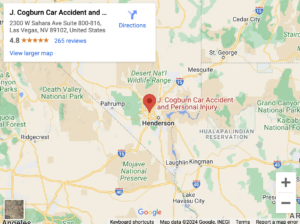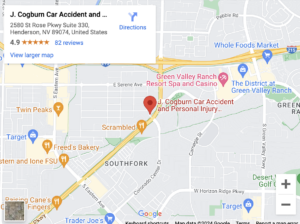J. Cogburn Car Accident and Personal Injury Lawyers provides the following resources to learn more about personal injury in Las Vegas and Henderson, Nevada. Call 702-996-4786 or 702-541-9766 for legal assistance.
Personal Injury Resources
- How Are Pain and Suffering Damages Calculated?
- What Are Economic Damages?
- What Are Non-Economic Damages?
- What Is Negligence?
- Understanding Punitive Damages in Nevada
Las Vegas City Resources
- Clark County, Nevada – Clark County, NV’s official site offers local government services, public records, permits, and community news.
- Las Vegas, NV -The official site for Las Vegas, NV, is your go-to source for city services and information. Access public records, pay utility bills, apply for permits, and stay updated with local news and events.
- City of Las Vegas Municipal Court System – The Las Vegas Municipal Court website offers convenient access to case information, payment options, and court services.
- Las Vegas Township Justice Court Records Inquiry – The LVJCPA website by Clark County, NV, provides easy access to property tax information, payment options, and assessment details.
- Las Vegas, NV News – Explore the latest news on Las Vegas, NV, with Google News. Stay informed on local events, developments, and stories impacting the community.
- Visit Las Vegas, NV – Discover Las Vegas on the official USA travel site. Explore world-famous attractions, vibrant nightlife, luxury hotels, and gourmet dining options.
- Clark County Justice Court – The Las Vegas Justice Court’s official site provides access to case information, court services, and legal resources. Pay fines, look up case statuses, file documents, and find information on jury duty.
- Visit Las Vegas, Official Site – Visit Las Vegas’ official site to plan your ultimate trip. Discover top attractions, world-class entertainment, luxury hotels, and fine dining.
- All Things To Do in Vegas – Vegas.com is your comprehensive guide to experiencing Las Vegas. Find great deals on hotels, show tickets, tours, and attractions.
- Las Vegas, Wikipedia – The Las Vegas Wikipedia page offers an in-depth look at the city’s history, culture, and economy. Learn about its origins, major landmarks, demographics, and notable events.
Henderson City Resources
- City of Henderson Nevada – The City of Henderson’s official website offers a gateway to community services, events, and government resources. Discover information on city departments, public safety updates, recreational activities, and business opportunities.
- Henderson Justice Court – The Henderson Justice Court, part of Clark County, NV, provides essential court services and resources. Access case information, payment options, and court procedures specific to Henderson residents.
- Henderson Chamber of Commerce – The Henderson Chamber of Commerce website connects businesses with resources, networking opportunities, and advocacy in Henderson, NV.
- City of Henderson Government Facebook – Stay connected with the City of Henderson on Facebook for updates on events, community news, and important announcements.
- Henderson Historical Society – The Henderson Historical Society’s website celebrates and preserves the rich history of Henderson, NV. Explore exhibits, events, and educational resources showcasing the city’s cultural heritage.
- Henderson, Nevada – Data Centers – Google – Learn about Google’s data center in Henderson, NV, ensuring secure and efficient cloud services. Discover its impact on local infrastructure and economy, supporting technology advancements in the region.
- Henderson Libraries – Explore Henderson Libraries’ website for access to books, digital resources, events, and community programs.
- Henderson, Nevada, Wikipedia – The Wikipedia page on Henderson, Nevada provides a comprehensive overview of the city’s history, geography, demographics, economy, and culture.
Nevada Government Resources
- State of Nevada, Government Site – The official Nevada state website provides essential information on government services, public resources, and state news. Access forms, pay taxes, find job opportunities, and stay updated on Nevada’s latest developments
- Nevada State Bar – Find continuing education resources, legal news, and information on bar admissions, ensuring comprehensive support for Nevada’s legal community.
- Nevada Supreme Court – this website provides access to court information, case searches, legal forms, and resources.
- Nevada Legislature – Official site that offers information on legislative sessions, bills, and statutes. Access resources on state lawmakers, committee activities, and public hearings, staying updated on Nevada’s legislative process.
- Nevada Constitution – Justia’s Nevada Constitution page provides the full text of the state’s constitution, along with amendments and historical context.
- CDC (Centers for Disease Control and Prevention) – The CDC’s official site offers comprehensive health information, including disease prevention, health guidelines, and research updates. Access resources on vaccinations, public health data, and emergency response to stay informed and healthy.
- FMCSA (Federal Motor Carrier Safety Administration) – Access information on licensing, safety standards, and enforcement programs to ensure road safety and regulatory adherence for commercial drivers and companies.
- NDOI (Nevada Division of Insurance) – Obtain licensing details, file complaints, and find educational materials to navigate Nevada’s insurance landscape.
- NDOT (Nevada Department of Transportation) – This website provides essential information on road conditions, construction updates, and transportation projects
- NTSB (National Transportation Safety Board) – Get data on accidents, safety improvements, and advocacy efforts to promote safer transportation nationwide.
- DHHS (Nevada Department of Health and Human Services) – Reach information on Medicaid, child welfare, mental health services, and public health initiatives to support Nevada residents’ well-being.
- Nevada Association of Counties – Obtain information on legislative issues, county services, and collaborative efforts to address community needs and promote effective governance across Nevada.
- United States Census Bureau, Nevada – Explore demographic profiles, economic indicators, and social characteristics essential for understanding Nevada’s population and trends.
- Nevada State Senate – Gain entry to info concerning bills, committee details, and session schedules to stay informed about Senate proceedings and lawmakers’ activities.
- The Nevada Department of Health and Human Services (DHHS) – This website provides comprehensive resources on healthcare services, social programs, and public health initiatives.
Las Vegas Local Resources
Highly Rated Chiropractors in Las Vegas
- One Stop Injury Center
1264 S. Nellis Blvd., Las Vegas, NV 89104 - 20/20 ChiroYoga
7160 Rafael Rivera Way, Suite 325, Las Vegas, NV 89113 - ChiropracTED
8560 S. Eastern Ave., Suite 150, Las Vegas, Nevada 89123 - Southern Nevada Chiropractic
4800 E. Bonanza Road, Suite 2, Las Vegas, NV 89110 - Spinal Rehab
5601 N. Tenaya Way, Suite 103, Las Vegas, NV 89130
Highly Rated Physical Therapists in Las Vegas
- Accident & Injury Physical Therapy
3880 E. Flamingo Road, Suite 201, Las Vegas, Nevada 89121 - Suarez Physical Therapy
6930 S. Cimarron Road, Suite 160, Las Vegas, Nevada 89113 - Injury Rehab
600 S. Rancho Drive, Suite 113B, Las Vegas, Nevada 89106 - Kelly Hawkins Physical Therapy
2080 E Flamingo Rd #111, Las Vegas, NV 89119
Therapists in Las Vegas
- Ever Brave Treatment Centers
8689 W Sahara Ave Ste 100 Las Vegas, NV 89117 - Dr. Jim Jobin & Associates
5510 S Fort Apache Rd Las Vegas, NV 89148 - The Parkey Group
6625 W Sahara Ave Ste 8 Las Vegas, NV 89146 - Soul Counseling with Shannon
6268 S Rainbow Blvd Ste 110 Las Vegas, NV 89118 - Comprehensive Therapy Centers
3602 E Sunset Rd Ste 100 Las Vegas, NV 89120
Highly Rated Auto Repair Shops In Las Vegas
- Universal Motorcars
5585 Spring Mountain Rd Las Vegas, NV 89146 - H-Tech Auto
2069 S Rainbow Blvd Las Vegas, NV 89146 - Passion Auto Repair
2695 S Decatur Blvd Ste 300 Las Vegas, NV 89102 - MVR Auto Repair
6000 W Windmill Ln Las Vegas, NV 89139 - Roadside Wrench Mobile Repairs
4881 W Hacienda Ave Las Vegas, NV 89118
*Disclaimer – we do not endorse these companies or profit from having them listed on our website
Henderson Local Resources
Highly Rated Chiropractors in Henderson
- One Stop Injury Center
1489 W. Warm Springs Road, Suite 125, Henderson, NV 89014 - 20/20 ChiroYoga
1010 Wigwam Pkwy, Suite 100, Henderson, NV 89074 - Johnson Family Chiropractic
2481 W. Horizon Ridge Pkwy., Suite 110, Henderson, NV 89052 - Southern Nevada Chiropractic
1701 N. Green Valley Plwy. Bldg 8A, Henderson, NV 89074 - Advanced Spine & Rehabilitation
715 Mall Ring Circle, Suite 100, Henderson, NV 89014
Highly Rated Physical Therapists in Las Vegas
- Align Physical Therapy
10895 S Eastern Ave Ste 120 Henderson, NV 89052 - Kelly Hawkins Physical Therapy
270 E Horizon Dr Ste. 100 & 101 Henderson, NV 89015 - Tim Soder Physical Therapy, Wellness & Sports Performance
2779 W Horizon Ridge Pkwy Ste 100 Henderson, NV 89052 - FYZICAL Therapy & Balance Centers
9005 S Pecos Rd Ste 2520 Henderson, NV 89074 - Dignity Health Physical Therapy
400 N Stephanie St Ste 310 Henderson, NV 89014
Highly Rated Therapists in Henderson
- NV Behavioral Health Services
2431 W Horizon Ridge Pkwy Ste 110 Henderson, NV 89052 - Sheeilu Satyapriya, Healing Conversations
170 S Green Valley Pkwy Ste 300 Henderson, NV 89012 - Ashton Martini
3005 W Horizon Ridge Pkwy Ste 201 Henderson, NV 89052 - Access Psychiatric Associates
305 N Pecos Rd Ste F Henderson, NV 89074 - Your Story Counseling
1545 Wigwam Pkwy Ste 521 Henderson, NV 89074
Highly Rated Auto Repair Shops In Henderson
- Elite Automotive
7665 Commercial Way Ste G Henderson, NV 89011 - Rebel Automotive
975 American Pacific Dr Ste 105 Henderson, NV 89014 - My Wheel Guy
169 N Gibson Rd Henderson, NV 89014 - Sonny’s Auto Repair
1000 Stephanie Pl Ste 8 Henderson, NV 89014 - Valvoline Instant Oil Change
4036 E Sunset Rd Henderson, NV 89014 - Aloha Automotive Service & Repair
745 W Sunset Rd Unit 20 Henderson, NV 89011
*Disclaimer – we do not endorse these companies or profit from having them listed on our website.


